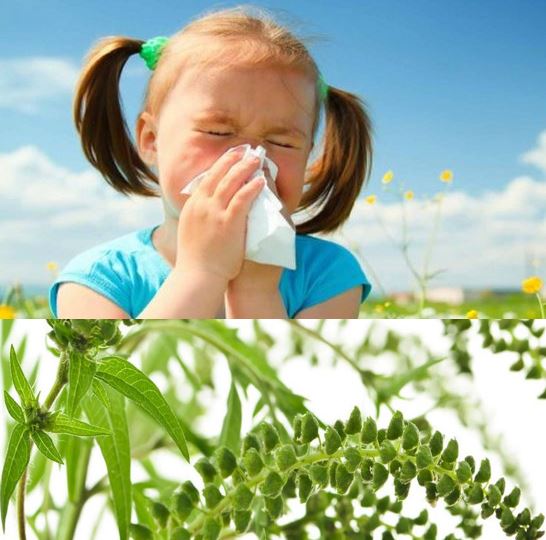Incidence and severity of hay fever in the UK is expected to rise because of climate change, which is predicted to accelerate the spread of ragweed, an invasive plant from North America, moving northwards from Central Europe. Hay fever seasons are also likely to get longer.
Ragweeds come from the tropical and sub-tropical regions of the New World, mainly North America. Several species have been introduced to Europe, with some becoming naturalized.
Ragweed pollen is notorious for causing hay fever in humans. Nearly 50% of all hay fever (pollen-related allergic rhinitis) cases in North America are linked to ragweeds.
 Does this mean that many young British hay fever sufferers, like this girl, can expect longer periods of allergic reactions each year, as the ragweed (bottom image) moves northwards?
Does this mean that many young British hay fever sufferers, like this girl, can expect longer periods of allergic reactions each year, as the ragweed (bottom image) moves northwards?
So far, instances when ragweed pollen loads across Britain are high enough to cause hay fever symptoms are extremely rare.
Will climate change raise pollen levels in northern Europe?
A team of scientists from France, Austria, Italy and the UK wanted to find out whether these events (pollen levels from ragweed causing hay fever symptoms) might become more frequent and severe in future in response to global warming.
Specialists from Rothamsted Research in Hertfordshire, together with colleagues in continental Europe, worked on a project called ATOPICA, funded by the EU. The aim was to predict how the extent and magnitude of the ragweed pollen cloud may change by 2050.
Things will get worse even with no climate change
The scientists, who published their findings in the academic journal Nature Climate Change, found that even without global warming, pollen loads would increase in Northern Europe as ragweed continues to fill available habitats, i.e. continues moving northwards.
British hay fever sufferers today have to contend with huge amounts of pollen released into the atmosphere by trees in the spring and grasses in early summer.
The Common ragweed (Ambrosia artemisiifolia) is expected to make things much worse.
During the months of August and September, large populations of ragweed in France, Italy and Hungary produce an allergenic pollen cloud that is carried in the wind. This means that hay fever sufferers get symptoms across a much wider area than the current distribution of the plant.
As ragweed plants flower later in the year, their effect will be to prolong the hay fever season, from the current early spring to early summer, through to September, when most sufferers currently breath a sigh of relief that it is all over.
After factoring in the combined effect of the future distribution of the plant plus climate change, the scientists predict that the problem will get much worse.
Ragweed pollen concentrations will soar
By 2050, airborne ragweed pollen concentrations are estimated to reach current levels multiplied by a factor of four.
Rothamsted Research wrote on its website:
“We would expect this to lead to increased sensitisation of the UK population to ragweed pollen and more people suffering hayfever symptoms later into the summer in the future.”
“These results highlight the need for increased surveillance of the incidence both of ragweed pollen in pollen traps and possible colonising plants of ragweed in the UK.”
Rothamsted Research plant ecologist Dr. Jonathan Storkey said:
“Once established, ragweed is difficult to eradicate because of its long-lived seed, its capacity to re-sprout after cutting and its propensity to evolve resistance to herbicides.”
“Our results indicate that controlling the current European ragweed invasion will become more difficult in the future as the environment will be more favourable for ragweed growth and spread, highlighting the need for the development of regionally co-ordinated eradication programmes.”
Citation: “Effects of climate change and seed dispersal on airborne ragweed pollen loads in Europe,” Lynda Hamaoui-Laguel, Robert Vautard, Li Liu, Fabien Solmon, Nicolas Viovy, Dmitry Khvorosthyanov, Franz Essl, Isabelle Chuine, Augustin Colette, Mikhail A. Semenov, Alice Schaffhauser, Jonathan Storkey, Michel Thibaudon and Michelle M. Epstein. Nature Climate Change. Published online 25 May, 2015. DOI: 10.1038/nclimate2652.

